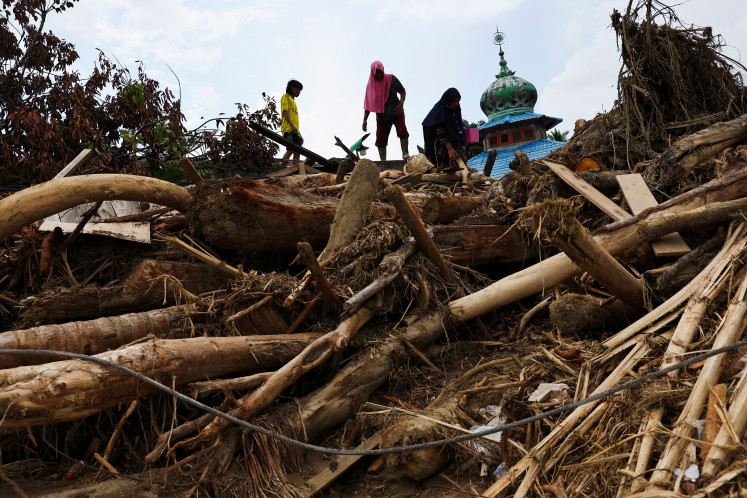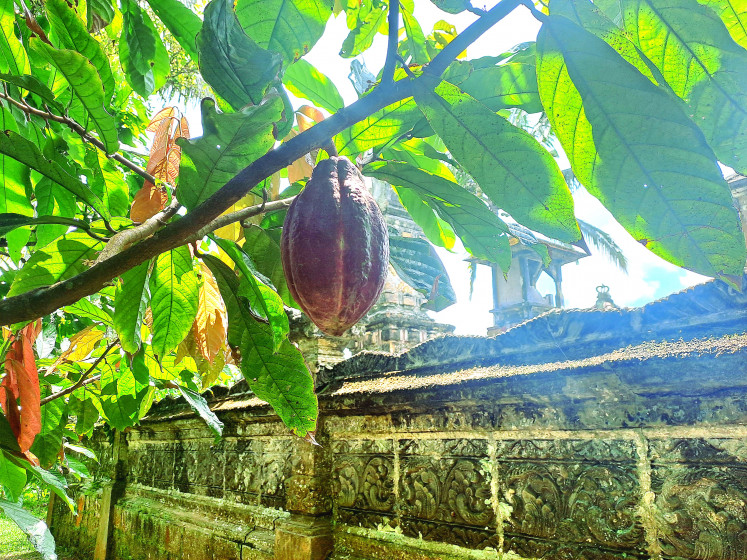Popular Reads
Top Results
Can't find what you're looking for?
View all search resultsPopular Reads
Top Results
Can't find what you're looking for?
View all search resultsHelping smallholders in palm oil
The increasing demand for palm oil for food and energy has prompted the Indonesian government to determine a strategy to increase palm oil production, among others, by issuing Agriculture Ministerial Decree No
Change text size
Gift Premium Articles
to Anyone
T
he increasing demand for palm oil for food and energy has prompted the Indonesian government to determine a strategy to increase palm oil production, among others, by issuing Agriculture Ministerial Decree No. 33/2006 on plantation development through plantation revitalization programs.
Currently, Indonesia is the biggest producer of crude palm oil (CPO) in the world, surpassing Malaysia. However, Indonesia still lags behind Malaysia in CPO productivity. Palm oil production in Indonesia is less than 4 tons per hectare per year, while in Malaysia, production has reached more than 5 tons per ha per year.
It indicates that the higher production in Indonesia occurs in light of oil palm plantation expansion. Among the three groups of palm oil producers, the area of smallholders’ plantations grew at the highest rate, namely 11.4 percent per annum, which is much higher than that of private companies (5.4 percent) and state-owned companies (1.1 percent).
The rapid forest and arable land conversion for oil palm indeed raises concerns, among others, on deforestation, decreased food production and loss of biodiversity. The above circumstances pose a challenge for Indonesia to comply with consumer-driven demand for sustainable palm oil production.
Prerequisites determined by the Roundtable on Sustainable Palm Oil (RSPO) have created segmentation or barriers in the global palm oil market, particularly to enter the European Union market. Holding an RSPO certificate by palm oil producers is a must for this market. In the future, such a demand may increase and come from a wider range of global consumers (including from non-European countries) due to the massive campaign for social and environmentally friendly products (i.e. sustainable production). Indeed, sustainable palm oil production has become a goal of oil palm plantations in Indonesia.
The area of oil palm plantations run by independent smallholders continues to rapidly increase at the expense of forest and farmland. This area grows massively and in an uncoordinated and disorganized manner. In Indonesia, there are many palm oil mills that do not have their own plantations. Apparently, these mills require and depend on supply from independent smallholders. The presence of such palm oil mills has raised the number of local agents (middlemen) who buy fresh fruit bunches (FFBs) directly from farmers. Local agents usually offer small loans to farmers in order to attract and bind them into informal contracts. On top of that, the sorting mechanism becomes loose due to high competition among local agents in getting FFBs, thus they often accept the mixing of inferior products with superior ones.
How to fix problems at independent smallholders in order to make them able to respond global challenges on sustainable palm oil production (through RSPO certification) remains a task for the government, farmers and related stakeholders. The RSPO (2007) defines “sustainable palm oil production” as management and governance of palm oil production that complies with the law, economic viability, ecological appropriation and social well-being. Those principles are perceived as very weak in the production systems of independent smallholders.
First, with regard to the legal aspect, the implementation of property right regimes are still an issue for independent oil palm plantations. Farmers who convert forests into oil palm plantations face the problem of legality of land use.
Second, oil palm plantations belonging to independent smallholders are very small in general (less than 5 ha). With such an area of production, farmers hardly meet economies of scale.
Third, environmental problems that constitute issues in the case of independent smallholders occur due to, among others, slash-and-burn practices in clearing forest and impacts of oil palm trees on other crops.
Fourth, the rapid growth of the palm oil business has promoted social change in rural communities. Palm oil businesses offer higher liquidity to farmers compared to food farming businesses (e.g. rice farming).
Preparing independent smallholders in order to be certified by the RSPO or the Indonesian Sustainable Palm Oil (ISPO) system and to be able to compete globally should become an agenda of plantation developments in Indonesia. Cooperatives are one of the forms of governance that is relevant for independent smallholders in Indonesia.
However, learning from the government’s program of nucleus estate and smallholders (NES), many cooperatives fail to increase the welfare of their members, because many cooperatives only work to facilitate FFB marketing from farmers to palm oil mill.
In order to achieve standardized production practices, the role of cooperatives should also cover organizing production activities, including supplying production input (e.g. fertilizer) for their members. Setting up standardized practices is important to result in uniformity of productivity and product quality so that cooperatives can negotiate a better price. The establishment of cooperatives should be based on collective action among the farmers, and this can be raised if farmers have common goals, namely to increase productivity and to accomplish sustainable palm oil production.
Another form of governance that may be applied in the case of independent smallholders is contract farming. Transactions in contract farming are organized between a cooperative or a farmer group and the firm. It provides smallholders with access to the market, technology and credit for increasing farm size and production input. Apart from these benefits, many problems have been reported in the implementation of contract farming. Smallholders used to be the marginalized party in the contractual relationship. Complaints also arise from the firm’s side, such as low commitment of farmers in selling the product only to the contracting firm and their inability to deliver their product on time and to meet the agreed standards (Barret et al., 2012).
To minimize these problems, the Food and Agricultural Organization (FAO) of the United Nations (2012) has issued guiding principles for responsible contract-farming operations. Looking at the problems and challenges faced by oil palm smallholders in Indonesia, contract arrangements should cover important issues, such as the provision of input of production and technical consultancy, transparency in price information and, last but not least, preparation for replanting.
____________________________________________________
The writer is a magister science student of the double degree program of Bogor Institute of Agriculture (IPB) and the University of Göttingen. The views expressed are her own.










